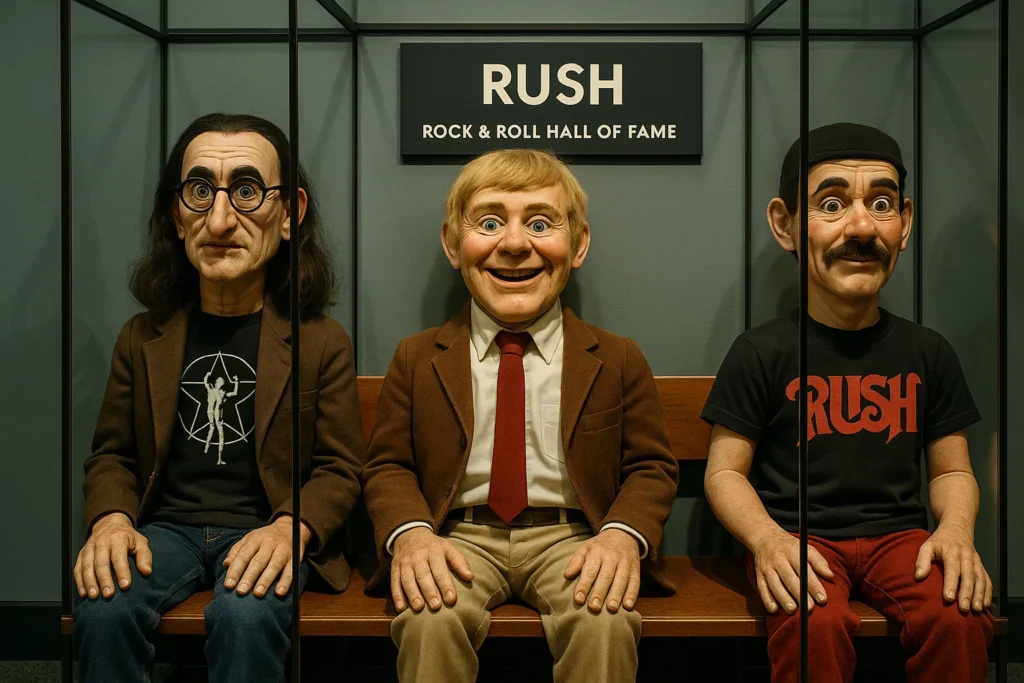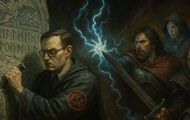To be a Rush fan is to nurse a particular kind of grief. It is the mourning of potential unfulfilled, of a path not only abandoned but betrayed. The band’s trajectory is a stark case study in artistic and moral abdication—a deliberate retreat from the rebellious principles that made them titans into a state-approved silence as the world they once championed burns.
The Ascent: Forging Swords in a Psychedelic Fog
Their initial ascent was nothing short of miraculous. In an era of rock star hedonism, Rush weaponized a new kind of virtuosity rooted in philosophical conviction. Albums like 2112 and Farewell to Kings were manifestos set to music. They were declarations of the individual creative spirit against the gray, collectivist tide. The music was monolithic, the riffs were swords, and Neil Peart’s lyrics were a call to arms for the thinking adolescent. They were, for a glorious moment, the most dangerous band on the planet.
The Faustian Bargain: When Rebellion Calcified into Dogma
The fatal turn was not one of style, but of soul. The embrace of Ayn Rand’s Objectivism was a Faustian bargain. What began as an act of rebellion against collectivist conformity calcified into a new orthodoxy—one that mistook cold rationality for strength. It was a sterile framework that gutted their music of its inherent humanity, replacing the organic wisdom of the West with a cold, mechanistic view of man.

Eventually, this philosophical hollowing-out manifested audibly as their synthesizer era dawned. The guitar, the instrument of individual will, was subjugated to synthetic textures. Alex Lifeson, the band’s soul, was reduced from a co-architect to a decorator, politely deferring—a capitulation that speaks volumes of a Canadian tendency to prioritize collective harmony over individual assertion.
The Retreat to the Ivory Tower
As punk and new wave exploded, slicing through rock’s bloated pretension with raw urgency, Rush doubled down. They released Hemispheres—which included an 18-minute allegory about the human brain with the same title—while The Clash sang about concrete revolution. It was the ultimate act of ivory tower indulgence, a tone-deaf retreat from the culture into abstraction.
The Panicked Pivot: From Originals to Followers
The final, damning evidence of their confusion was not that they ignored the trends, but that they later, clumsily, tried to emulate them. Within a few short years, the robes were gone, replaced by skinny ties; the epic suites were truncated into Police-inflected pop songs. This was not evolution. It was a panicked, belated attempt at relevance by a band that had exhausted its own intellectual project. They went from being unique originals to derivative followers.

Compare this to the eternal wellspring of a band like Led Zeppelin. Their music was nourished by the deep, earned gravitas of the blues—a tradition born of real human experience. Rush’s wellspring was another band’s harvest. Once that was exhausted, they were left with only their own increasingly soulless technical prowess.
The Ultimate Betrayal: Fiddling While Free Speech Burns
Yet their ultimate failure transcends music, a point I made with devastating clarity in my earlier critique for this publication, Rush’s Alex Lifeson and Geddy Lee Fiddle-Faddle While Free Speech Burns in Canada. In their homeland, a brutal regime of censorship and compelled speech now targets dissenters. The principles of individual liberty that Rush once mythologized are being systematically dismantled by the state.
Where are the voices of Lee and Lifeson? They are silent. The ultimate confirmation of this moral bankruptcy came in the summer of 2025, when Alex Lifeson chose to break his political silence not to defend his fellow Canadians, but to appear as a special guest of Rage Against the Machine’s Tom Morello in Toronto. There, he performed “Limelight,” basking in the applause while sharing a stage with a musician whose entire brand is built on performative radicalism that aligns perfectly with the Trudeau regime’s woke, globalist agenda. This is the final, sickening irony: the man who once warned of the “Priests of the Temples of Syrinx” now provides the soundtrack for their victory lap. They offer no anthems for the truckers whose bank accounts were frozen. Instead, they engage in nostalgic fiddle-faddle, content to be beloved elder statesmen of a neutered culture. They have become the very Priests they once warned us about.
Conclusion: The Machine That Killed the Music
For those who heard in 2112 the sound of defiance, the later years feel like watching a lion pace in a zoo enclosure—majestic still, but tamed and useless. Rush’s legacy is a warning. It is the story of how a band can trade the sword for the schematic, how rebellion can curdle into empty dogma, and how the pursuit of intellectual complexity can murder not only the heart of rock and roll, but the courage required to defend the freedom that makes such art possible. They built a perfect, intricate machine, and in doing so, killed the thing it was meant to protect. Rush became the machine.
—Wolfshead




